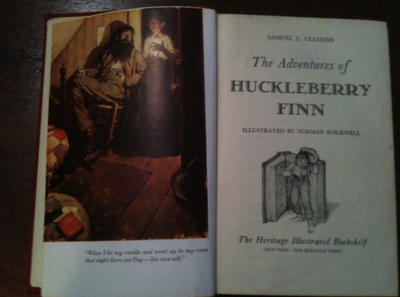Huck, Revisited

One of my favorite books growing up was The Adventures of Huckleberry Finn. My older sister checked it out of the library and first read it to me when I was seven, but I enjoyed the experience so much that I immediately sat down and reread it myself. Then our new lab puppy gnawed one end of the cover, so we had to buy the book from the library and it became ours. At the time it seemed a calamity (money was tight in those days, as my dad was in grad school) but it was really a gift. And since it’s one of the old 1930’s copies with the Norman Rockwell illustrations, I’m still glad to have it, chewed back cover and all.
I don’t remember how many times I read Huck Finn during my growing years, although I’ve no doubt the story had an enormous influence on me in ways I probably still don’t understand. But it had been a long time since I floated down the Mississippi with Huck and Jim, and so this past weekend I downloaded the book to my iPad and revisited my childhood.
**
What did I discover? That the book is even funnier than I remembered—or perhaps it’s simply funnier than I completely appreciated as a child. I was surprised by how clearly I recalled some segments, while others I remembered hardly at all. And as an author, I am in awe of Twain’s imagination and the way in which he wove together theme and character development and moral questioning.
I was also interested to discover that controversy has surrounded the book from the beginning; it provoked outrage back in 1884, when it was first published. Because it’s one of the first books written in the vernacular, critics called it rude and crude and morally objectionable. It was banned from libraries. Fast forward to our own era, and once again, Huck Finn frequently finds itself the focus of a storm of controversy, largely because the “n” word peppers the entire book and the character Jim is denigrated as stereotypical. Legions of earnest parents, educators, and moralists insist that children should not be allowed to read it. A new edition actually substituted “slave” for every “n” word in the book (even when referring to free men). At one point, CBS filmed it for television and left out Jim entirely!
**
Ironic, given that Huck Finn was written as a biting satire on racism and the moral hypocrisy that allowed it to flourish. The book is populated with a legion of nasty or foolish white people, from Huck’s “pap” and the “duke” and “king,” to the silly sisters who hand over their fortune to charlatans and multiple vicious mobs. Even Tom Sawyer is far from admirable; he cruelly (and dangerously) withholds the truth about Jim simply so he can have a grand “adventure”. The only really admirable adult in the entire book is Jim. Jim is brave, loyal, honest, trustworthy, and a good, loving father (in deliberate juxtaposition to Huck’s “pap”). Yes, he is superstitious, but so were most uneducated people in those days (see The Adventures of Tom Sawyer), and as the book progresses, his wisdom becomes more and more apparent to both Huck and the reader. I understand African-American frustration at being so often relegated to the role of wise mentor. But this is not a book about a black man aggressively fighting his way to freedom; it’s about a boy learning valuable lessons about human nature, racism, and hypocrisy as he grows to manhood. How is it a bad thing that his teacher is a black man?
**
As for the “n” word, how does an author write a book set in an era when the word was used by most of the population, and not use it? I can understand its offensiveness to people today; but does that mean that historical novelists must write anachronistic dialogue? Isn’t that rewriting history for the worst possible reasons? Why pretend that something offensive did not happen? Should we portray racist bigots as less offensive than they really were, simply to avoid using an historically accurate but vile word? How is it a good idea to throw away what could be learned by a thoughtful, sensitive, honest exploration of those times?
Your thoughts?
Published on June 18, 2012 09:34
No comments have been added yet.



